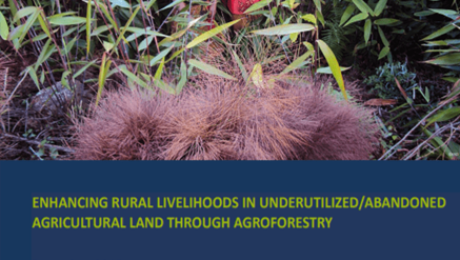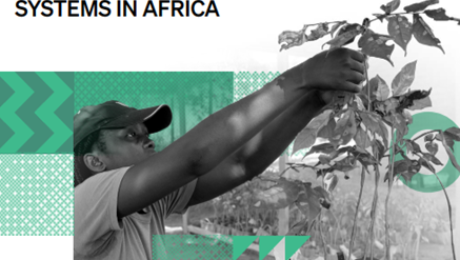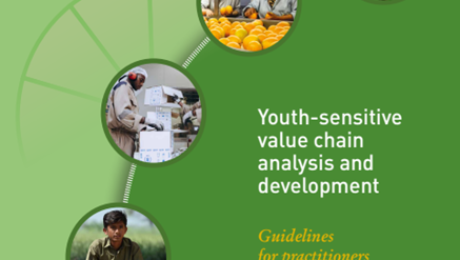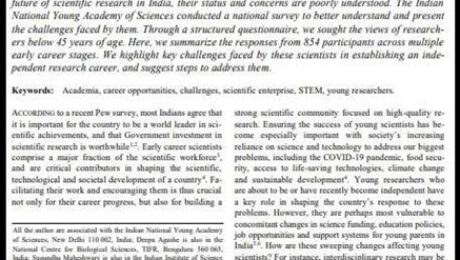Do soil health tests match farmer experience? Assessing biological, physical, and chemical indicators in the Upper Midwest United States
Soil health testing provides an integrated assessment of biological, physical, and chemical attributes to inform the sustainable management of farm fields. However, it is unclear how tests reflect farmers’ own assessments of soil quality and agronomic performance, which may disproportionately influence farm management practices. We asked farmers in three regions of Michigan to identify three fields to compare their own assessments against soil health tests: a “best,” a “worst,” and a “non‐row crop” reference field. Each field was tested for soil aggregate stability, available water capacity, soil organic matter (SOM), mineralizable carbon (MinC), permanganate oxidizable carbon (POXC), pH, P, and K. We evaluated soil health scores using paired t tests to compare results from contrasting fields with farmers’ assessments of each field. Across all farms, the overall soil health test score for cropped fields was significantly higher on fields farmers rated as “Best.” This result was driven solely by physical and biological (including C) parameters; inorganic chemical tests did not distinguish among field types. On reference fields in all regions, biological parameters were consistently higher, but inorganic chemical and physical measures were not. The performance of soil C measures was inconsistent: SOM and MinC consistently detected significant differences between “Best” and “Worst” cropped fields, but POXC did not. Our results suggest that common soil health assays for physical and biological attributes generally align well with farmers’ assessments of their fields. That soil health tests match farmer experience reinforces the value of these tests as a meaningful guide for soil management decisions.
- Published in NATURAL RESOURCE MANAGEMENT
Water availability, use and challenges in Pakistan – Water sector challenges in the Indus Basin and impact of climate change 2021
This working paper takes stock of Pakistan’s water resource availability, delineating water supply system and its sources including precipitation and river flows, and the impact of increasing climatic variability on the water supply system. In particular, the paper focuses on the current water usage and requirements in the agricultural sector, and how changing climatic conditions will affect the consumption patterns. With inflows expected to become more variable in the coming years, the severity of climatic extremities will become more pronounced, driving up water demands in addition to the demand increase from a rising population and urbanization. Over extraction of groundwater resources is also disturbing the water calculus and pushing the country towards a critical demand-supply gap.
- Published in NATURAL RESOURCE MANAGEMENT, PAKISTAN
Accounting of Water for Improved Management of Water Resources
Pakistan’s population is expected to reach 221 million by 2025 and, coupled with growing impacts of climate change, the country is expected to respond to pressures on limited water resources due to population growth and a growing need for climate resilient livelihoods. As such, federal and provincial Pakistani authorities have recognized the importance of ensuring water availability and access in order to adequately respond to national agricultural, sanitation and industrial needs. Agricultural production is especially important given that the agricultural sector consumes close to 90 percent of all currently available fresh water supplies in the country. While agriculture accounts for the overwhelming majority of water resources used, it is also the sector responsible for producing more than 90 percent of the country’s food supply and generating 75 percent of the country’s export revenues. Unsurprisingly, agriculture and food production account for 20 percent of Pakistan’s gross domestic product (GDP). Therefore, rural livelihoods are particularly vulnerable to climate-driven water scarcity, given the country’s largely arid to semi-arid climate and its high dependency on a single river system: the Indus River Basin System. Despite being the world’s largest contiguous irrigation system and the main water lifeline for Pakistan’s household consumption, sanitation and economic activities, there is insufficient data on water availability, use and governance specific to the Indus River Basin. Moreover, a marked increase in the number of private tube wells over the last 30 years has changed underground water pumping modalities. In light of the limited awareness on the importance of joint efforts for water management, the project helped establish these links between different uses of water along multiple sectors and locations around the country. It convened actors to assess water governance through a systems approach, where the concerns and priorities of all stakeholders concerned were reflected and understood by others.
- Published in NATURAL RESOURCE MANAGEMENT, PAKISTAN
Enhancing Rural Livelihoods in Underutilized/Abandoned Agricultural Land through Agroforestry
Nepal is facing an increasing problem of underutilization/abandonment of agricultural land In the context of food insecurity and poverty across rural communities, the growing current scale of abandonment of agricultural land has become one of the key development challenges in recent decades As a result of this trend, rural hill districts are currently experiencing food insecurity due to a lower rate of production and productivity per hectare This has created a challenge in terms of feeding a growing population In this context, the only way to address the problem of food insecurity is to increase agricultural production and the productivity of available land In order to address this emerging issue, as per the request and cooperation of the Government of Nepal, FAO and the International Union for Conservation of Nature ( implemented the pilot project, “Enhancing rural livelihoods in underutilized/abandoned agricultural land through agroforestry” with the objective of identifying and assessing approaches for implementation of so called “best bet” agroforestry options that have the potential to generate production and income from abandoned agricultural land.
- Published in NATURAL RESOURCE MANAGEMENT, NEPAL
The Rural Youth Action Plan
The FAO Conference in 2017 endorsed the call to develop a rural youth action plan that addresses the importance of making rural areas more attractive for young women and men. Under the aegis of the Committee on Agriculture (COAG), the Rural Youth Action Plan (RYAP) was developed and presented at COAG’s Twenty- seventh Session in 2020. The Plan presents a five-year Action Plan (2021–2025), aligned to five thematic areas (or pillars) with the goal of contributing to the realization of the Sustainable Development Goals (SDGs) by equally empowering rural young women and men. The RYAP is embedded in FAO’s Medium Term Plan (2022–2025), and serves as a key performance indicator (KPI) for the cross cutting theme on youth.
- Published in YOUTH
Creating resilient livelihoods for youth in small-scale food production
A collection of projects to support young people in achieving sustainable and resilient livelihoods and food security
This publication showcases initiatives that have been successfully implemented to help youth build resilience in the agrifood system, despite the severe consequences of climate change and formidable social and economic challenges. It aims to inspire potential policies and programmes by portraying key needs, challenges and initiatives, as well as lessons learned and opportunities for helping to improve the resilience of livelihoods for youth in small-scale food production. The aim is to draw recommendations from these initiatives, building on the Koronivia Joint work on Agriculture (KJWA) – a landmark decision under the United Nations Framework Convention on Climate Change (UNFCCC) that recognizes the unique potential of agriculture in tackling climate change.
- Published in YOUTH
Investment guidelines for youth in agrifood systems in Africa
The Investment guidelines for youth in agrifood systems in Africa, developed jointly by FAO and the African Union Commission (AUC) through a multi-stakeholder and participatory process, highlight the importance of youth as change agents and key stakeholders contributing to sustainable agrifood systems. The guidelines aim to accelerate investments in and by youth in agrifood systems by providing practical guidance – including tools and examples – to design, develop, implement, monitor and evaluate youth-focused and youth-sensitive investment programmes and to engage youth fully as partners in the entire process.
The guidelines were prepared with the support of the AUC and FAO Technical Cooperation Programme (TCP) “Partnership to Support AU’s Strategies on Social Protection, School Feeding and Rural Youth Employment” of the FAO Regional Office for Africa (RAF) and from the Investment Centre (CFI). This publication is part of the Investment Toolkits series under the FAO Investment Centre’s Knowledge for Investment (K4I) programme.
- Published in YOUTH
Youth-sensitive value chain analysis and development
This publication is intended to assist field practitioners, youth organizations and other stakeholders to identify binding constraints and viable opportunities to youth engagement in value chains that can translate into greater youth inclusion. Considering youth heterogeneity and inequalities, the youth sensitive framework for value chain analysis gives guidance to assess factors that push and pull youth into employment and entrepreneurship in value chains. The youth-sensitive value chain (YSVC) analysis is a starting point for youth-inclusive agricultural value chain development, since it identifies entry points and key actions expected to bring about the desired increase in employment and business opportunities for youth within a more attractive agriculture sector.
- Published in YOUTH
Let the Youth Lead in Nutrition
The theme of the INO 2021 was “Let the Youth Lead in Nutrition” focusing the youth in the forefront to address malnutrition and aligned with the global mandates set in UN Food Systems Summit (UN FSS) and Nutrition for Growth (N4G) Summit 2021. A variety of engaging and interesting activities and discussion sessions were organised at INO 2021.
A Dhaka Declaration has been drafted based on the discussion and recommendations as an outcome of the Olympiad.
Career challenges for young independent researchers in India
The scientific enterprise in India has grown dramatically in the past few decades, with research emerging as a viable and important career option for students of science. The country thus has a large population of young scientists in the early stages of establishing their independent research careers. While this demographic is arguably the most important group that will determine the future of scientific research in India, their status and concerns are poorly understood. The Indian National Young Academy of Sciences conducted a national survey to better understand and present the challenges faced by them. Through a structured questionnaire, we sought the views of researchers below 45 years of age. Here, we summarize the responses from 854 participants across multiple early career stages. We highlight key challenges faced by these scientists in establishing an independent research career, and suggest steps to address them.
- Published in YOUTH










